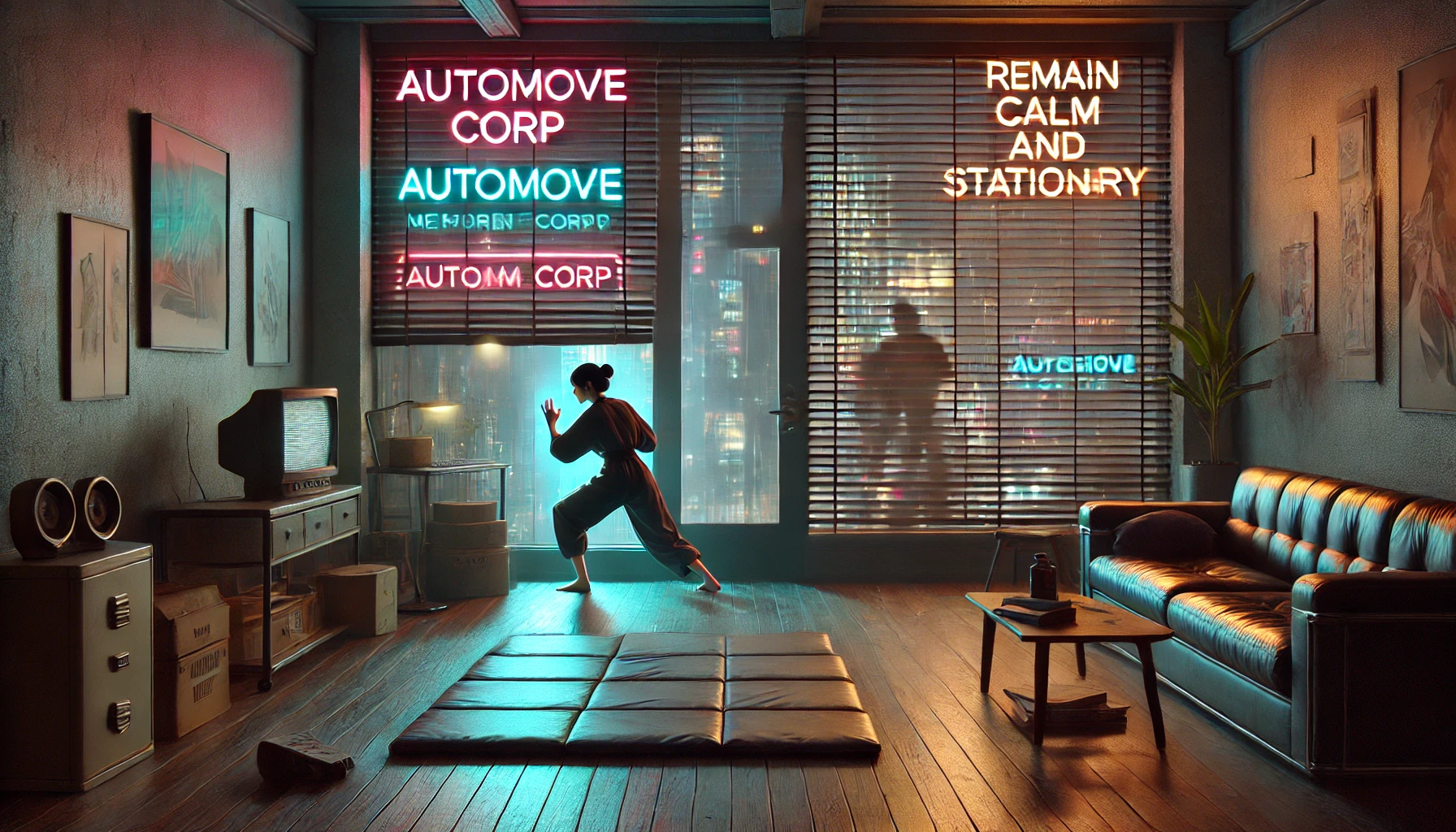“Remain calm and stationary. This message is brought to you by AutoMove Corp - Your Trusted Partner in Safe Transportation.” The MetroScreen flashed its hourly reminder as Sarah Chen rode the automated transit pod to work. Through the window, she watched an elderly woman being escorted off another pod by Movement Control officers. The woman’s crime was obvious - she’d been walking to the grocery store instead of using the mandatory AutoMove shopping delivery service.
The Kinetic Activity Prevention Act had passed three years ago, after researchers at the Global Health Institute (recently acquired by the Mobility Solutions Consortium) published their groundbreaking study: “The Fatal Cost of Unnecessary Motion.” Their data was irrefutable. Excessive physical activity created micro-tears in muscle tissue, accelerated joint wear, and - most alarmingly - generated dangerous levels of endorphins that led to movement addiction.
Sarah remembered the tipping point. It started with the massive class-action lawsuit against CrossFit and other gym chains. Then came the leaked emails from the “Big Walking” conspiracy - how athletic shoe companies had suppressed evidence about the dangers of bipedal locomotion for decades. The final blow was the viral video of a jogger having a “movement-induced crisis” in Central Park.
The Mobility Solutions Consortium - a conglomerate of autonomous vehicle manufacturers, robotaxi operators, and powered exoskeleton producers - had stepped in as the savior of public health. Their lobbyists worked tirelessly to pass the Emergency Motion Reduction Bill, which mandated the use of automated transportation for any distance greater than fifty feet.
At her office, Sarah’s desk automatically adjusted every thirty minutes to prevent any unconscious fidgeting. The MoveSafe™ bracelet (a mandatory purchase from AutoMove’s personal safety division) tracked her daily motion quota - she was allowed exactly 2,000 necessary movements per day. The company’s stock had tripled since the bracelet became legally required.
During her lunch break, she watched the latest public service announcement, sponsored by ElevatorTech Industries: “Former Marathon Runner Speaks Out.” A hollow-eyed man described his shameful past of running dozens of miles for no practical purpose. “I was destroying my body,” he confessed, “burning up precious calories in pointless locomotion. The Still Life Initiative, powered by the caring corporations of the Mobility Solutions Consortium, saved me.”
That evening, Sarah took a detour through her old neighborhood in her mandatory AutoMove pod. The martial arts dojo where she’d earned her black belt was now a Stationary Wellness Center, operated by a subsidiary of AutoMove Corp, where citizens could practice authorized minimal-movement meditation in powered assistance chairs. The dance studio next door had become a Motion Prevention Education facility, its mirrors replaced with screens showing endless loops of AutoMove commercials.
The automated sidewalks, installed at great expense by the Consortium, moved a steady stream of obedient citizens. A few years ago, people had protested against their installation. Now they were celebrated as public health infrastructure. The old bike lanes had been converted to charging stations for personal transport pods.
In her apartment, Sarah locked her doors and closed her blinds. She rolled up her carpet, revealing the pressure-sensor-blocking padding underneath. Then she did the unthinkable - she moved. A kata she still remembered from her karate days. Just one. Her muscles sang with the forbidden joy of it.
A knock at her door froze her mid-movement. “Movement Control! We’ve detected unusual activity patterns in this sector. Sponsored by AutoMove Corp - Protecting You From Harmful Motion.”
Sarah quickly sat down, forced her breathing to steady. She glanced at her MoveSafe™ bracelet - she’d exceeded her daily allowance by 47 movements. The overage fees would be automatically deducted from her account.
“Just a moment!” she called, using her last permitted movement of the day to wipe the sweat from her forehead. Tomorrow she’d be more careful. Tomorrow she’d embrace the stillness like a proper citizen. Tomorrow she’d renew her premium subscription to AutoMove’s Platinum Mobility Package.
But for now, her muscles still tingled with the memory of motion, and she couldn’t quite suppress a smile. In a world where movement was criminalized and corporations profited from stillness, simply walking had become an act of rebellion - not just against the law, but against the entire machine of corporate control.
